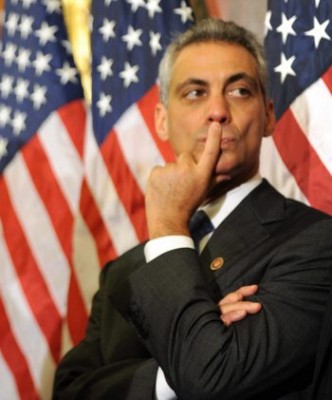 An Illinois court, in a 2-1 vote, put Rahm Emanuel’s bid for Chicago mayor on hold [court opinion-pdf]. Rahm was the frontrunner in the polls and has been a fundraising juggernaut. The issue is whether he meets the one year residency requirement for the office, given he was living in the Washington DC as Obama’s Chief of Staff. The rationale behind the residency requirement is an attempt to ensure that the candidate knows the wants and needs of her/his constituents.
An Illinois court, in a 2-1 vote, put Rahm Emanuel’s bid for Chicago mayor on hold [court opinion-pdf]. Rahm was the frontrunner in the polls and has been a fundraising juggernaut. The issue is whether he meets the one year residency requirement for the office, given he was living in the Washington DC as Obama’s Chief of Staff. The rationale behind the residency requirement is an attempt to ensure that the candidate knows the wants and needs of her/his constituents.
The court made various legal distinctions and ruled that he did not meet candidacy eligibility. While “carpetbagging” is nothing new in politics, the statutory laws in Illinois specify voter and candidate eligibility. While Rahm would be eligible to vote, he was not deemed eligible to be a candidate. His lawyers tried to use the remedy that he was in service of “business of the United States” as a reason for his not physically being in Chicago. The court interpreted the statute as only applying to voting.
While going after Rahm’s standing may be politically motivated, it nevertheless does bring up an interesting question on how the Illinois law should be interpreted. Proponents of allowing him on the ballot state that he is a Chicagoan and had every intent of returning to Chicago after his stint in Washington DC. Another argument is that it would be unfair to disallow his candidacy, likening his situation to a military person serving outside his home district and citing his history of being in Chicago.
On the other hand, is there something to the statute that requires a candidate for office to be physically present for a year in order to be eligible? Is Rahm somehow less qualified, possibly less in touch with his constituents, because he wasn’t in Chicago all year? Is this a matter of the rules being the rules and leaving the White House when he did, as opposed to earlier, was a risk he took on?
I feel he should have known better and if he knew he was going to run in February of 2010, he should have quit the White House then or at least have shown a commitment to being in the Chicago area on weekends, etc., between February of 2010 {or earlier} and when he moved to Chicago in October of 2010. Why? The statute is clear and him at least showing some commitment to being physically present shows a deference to the spirit of the law. Hindsight is 20/20 and nobody expects the Spanish Inquisition.
It will be interesting to see how this plays out. Some pundits say Rahm is to big of a player to be benched on the sidelines. He’s pretty confident that he will prevail, but, then again, it’s Rahm talking.
Twitterversion:: [blog] Thoughts on the court decision taking #RahmEmanuel off the Chicago mayor ballot @ThickCulture

Comments 1
Kenneth M. Kambara — January 28, 2011
The Illinois Supreme Court reversed this decision & Rahm is back on the ballot. The court decision is here [pdf].